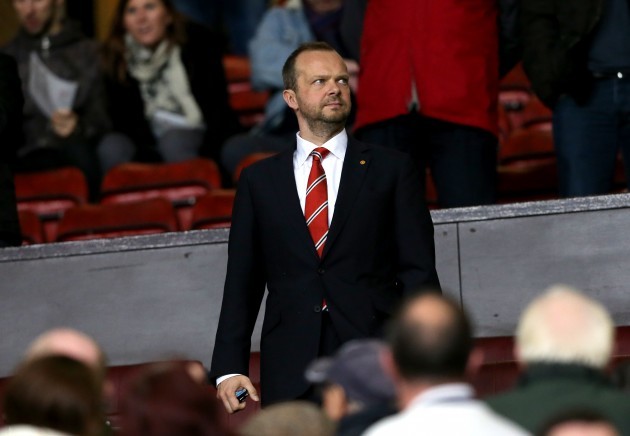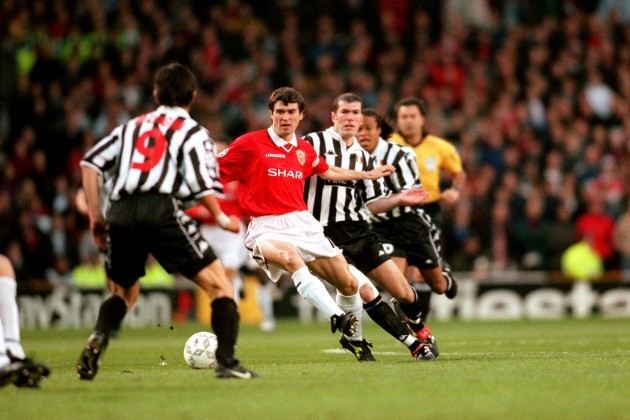LAST NIGHT’S COMPREHENSIVE defeat by Manchester City means United have now lost 10 league games this season — the most defeats they have ever suffered since the beginning of the Premier League era.
They may still be in the quarter-finals of the Champions League, but make no mistake, for Moyes and United, this season has been an unequivocal disaster when the inherently high standards they set are taken into consideration.
The City loss may have been relatively meaningless in the context of the Premier League table as far as the Red Devils are concerned, but that doesn’t mean it didn’t hurt — a sensation Moyes has admitted to feeling frequently this season.
While United would still have only had an outside chance of making the top four if they did win their recent matches against Liverpool and City (particularly in light of Arsenal’s recent struggles), it was the symbolic nature of these losses that would have been most galling for fans.
Of course, though such occasions were a rarity, United had been turned over at Old Trafford before Moyes set foot inside the club’s doors – the 4-1 loss to Liverpool in 2009 and 6-1 defeat by Man City in 2011 are prime examples of these once-infrequent setbacks.
Yet whereas under Ferguson, these results felt like freakish anomalies, since Moyes has taken charge, they have virtually become the norm.
The ex-Everton boss has been criticised for the manner in which he has reacted to losses, often claiming he “didn’t see it coming,” when outclassed by a major rival, or even suggesting his team “played quite well” after an unexpected defeat, despite significant evidence to the contrary.
Last night however, there was a conspicuous and brutal honesty evident in his post-match interview, in which he made a clear admittance that the current United team are simply not good enough.
“I think we have played a very good side, playing at the sort of level we are aspiring to. We need to come up a couple of levels ourselves because at the moment we are not there,” he told Sky Sports, after his team were outclassed by City.
These words will be hurtful for United fans to hear, particularly given that they reflect so well on their bitter rivals, yet even the most ardent Red Devils’ supporter will find the basic sentiments behind the assertion difficult to dismiss.
Given that he inherited the league champions, Moyes has received considerable criticism as a result of the regular setbacks that his team have subsequently encountered. And granted, many of these severe assessments have been valid — the Scot has been tactically out-thought too often this year by the likes of Jose Mourinho and Brendan Rodgers. The team may also be limited, but they are still good enough to put up more of a fight against sides of City’s calibre.
Moreover, though Moyes was not principally responsible for United’s failure to sign anyone of note other than Fellaini during the summer, he was hardly completely blameless for these issues either.
(Along with Moyes, United’s executive vice-chairman Ed Woodward has received criticism for the club’s failure to bring in players last summer)
It’s difficult to imagine someone of Jose Mourinho’s stature, for instance, meekly accepting such shortcoming in this department. At the very least, Mourinho would surely have signed a few stopgaps — experienced Samuel Eto’o-type players, who would have compensated to a degree for United’s obvious flaws, rather than simply hoping that the players at his disposal would pull off another miraculous title win.
Yet Moyes’ willingness to overlook or fail to recognise such weaknesses is indicative of a culture that was prevalent at Old Trafford long before he became manager there. In truth, United’s problems can traced as far back as Roy Keane’s decline and consequent departure in November 2005.
When it became clear that the Corkonian’s powers were receding, a number of heir apparents auditioned for a role as his successor — Liam Miller, Eric Djemba-Djemba, Kleberson and Alan Smith were among those who failed to convince, while Owen Hargreaves and Darren Fletcher came closer to reaching the Irishman’s level, but injuries ensured that they never really developed any substantial continuity or progress in their respective endeavours.
Ultimately, the club appeared to settle on Michael Carrick, for whom they paid £18.6 million to prise away from Tottenham in the summer of 2006, even giving him Keane’s patented number 16 shirt upon signing for the club. Carrick was and still is a good player, particularly against the weaker teams who allow the midfielder time on the ball to demonstrate his impressive passing range. But he is not world class, lacking the presence and leadership of a player in the Keane mould, and United can no longer afford to accommodate someone who isn’t of the highest calibre as a first-team regular in arguably the most important position on the pitch.
Too often, against the very top teams, Carrick’s lack of mobility has been exposed and he simply doesn’t have the talent or the speed of thought to make a definitive impact on proceedings, as all great midfield players should. Against both Liverpool and City this year, he has been dominated by Jordan Henderson and Fernandinho respectively. Marouane Fellaini, meanwhile, has arguably been worse — guilty of similar defensive flaws to Carrick without contributing as much as the Englishman going forward, though he at least has the excuse that long-term injuries have affected his fitness this campaign, and thus prevented him from acquiring any real momentum in his game.
Looking back on Keane’s exit, it was at least offset by the continuing presence of other key players who ensured United continued to thrive to an extent thereafter — Ryan Giggs and Paul Scholes were not unduly affected by the entry into the twilight years of their careers, while Rio Ferdinand, Nemanja Vidic and Patrice Evra were only beginning to hit their peak (indeed, the latter two only signed for United just over a month after Keane left). And not to mention the fact that they also had two exceptional young stars at their disposal in Wayne Rooney and Cristiano Ronaldo, both potential matchwinners who further served to help paper over the cracks for a period.
(United have been struggling to find an adequate Roy Keane replacement for years)
But while Van Persie may have been a decent eventual replacement for Ronaldo, in other areas, they have significantly worsened the team.
After the Red Devils won the league last year, Ferguson was asked whether his team was as good as previous United title-winning outfits. He replied in the affirmative, telling Sky Sports that “nostalgia does funny things to people’s brains”. However, the then-United manager was fooling no one.
In addition, last year, they at least still had Paul Scholes, who would have been a big influence in the dressing room as well as on the sporadic occasions he played, while other veterans were declining but — not insignificantly — a year younger. They had Ferguson who, unlike Moyes, is masterful psychologist and who has always specialised in getting the very best out of players, irrespective of their standard.
And perhaps more importantly, it was one of the weakest Premier League seasons in recent memory. Think about the other so called ‘contenders’ they had to compete against — teams who have mostly improved immeasurably since then. They were facing an Arsenal side who, as ever, had plenty of talent but lacked the necessary ruthlessness that has so often eluded them in recent years. A Liverpool outfit under Brendan Rodgers who were still very much in transition and becoming accustomed to the manager’s innovative footballing philosophy. A limited Tottenham team who were made to look above-average by an inspired Gareth Bale. And two talented sides that were undermined by managerial issues in the form of Manchester City and Chelsea. That said, even allowing for those factors, United still only won the league by staging edge-of-the-seat comebacks against average sides such as Aston Villa and pre-Pochettino Southampton. Effectively, they triumphed by default to a degree, with their rivals as anaemic then as they are clinical this time around.
Moreover, consider the famous 1999 United team:
Schmeichel; Neville, Johnsen, Stam, Irwin; Beckham, Keane, Scholes, Giggs; Cole, Yorke.
Now examine the team below:
De Gea; Rafael, Jones, Smalling, Fabio; Young, Anderson, Cleverley, Nani; Rooney, Welbeck.
In an ideal world for United fans, every young player in the modern version of the team would have fulfilled his potential by now, and Ferguson could have been toasting the success of building another great side. And surely, the legendary Scottish manager at one stage at least envisioned this being the case, as he sought to build a final group of outstanding youngsters ahead of his impending retirement.
Nonetheless, of the aforementioned names, arguably only Rooney, De Gea and maybe Jones with a bit more experience would be fit to lace the boots of the 1999 side’s stars, or indeed even their 1994 equivalents. The others would be squad players at best, competing for a place on the bench with the likes of Nicky Butt and Jesper Blomqvist. Rafael, Welbeck and Smalling might still become very good players in a year or two, yet Beckham, Scholes and Giggs scarcely needed such time to make an impact — only months after Alan Hansen famously proclaimed “you can’t win anything with kids,” United were league champions.
So essentially, the Old Trafford outfit are in desperate need of a summer clear-out — and perhaps only then can Moyes be judged definitively.
They could start by belatedly addressing their ongoing midfield issue and continue their longstanding search for a footballer with the energy, skill and leadership of Roy Keane. And ironically, the player they have been looking for may very well have been under their noses all along for some time. Paul Pogba has seriously impressed since leaving United after departing owing to the lack of first-team action he was being granted by Ferguson.
The French 21-year-old has even been linked with an improbable return to Old Trafford, such has been the stark impression he has made in helping Juventus establish a seemingly insurmountable lead at the top of Serie A.
Nevertheless, the latest rumours are linking him with a £35million move to Real Madrid in the summer — a destination he would presumably favour over a struggling club that never appreciated the full extent of his talent in the first place. And should he turn into the player he is expected to become, Pogba may well be looked back upon as Fergie’s biggest mistake — the Keane replacement that should have been and their one young upcoming talent truly worthy of comparison to the class of 99.



